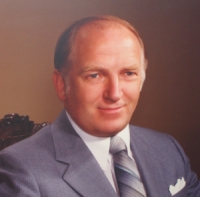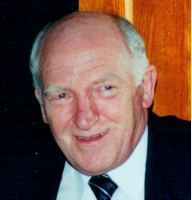Year Born: 1924
Year Died: 2014
Year of Induction: 1998
Pioneer – Member of CAB Hall of Fame
McCreath, Ross A. (1924-2014)


Ross McCreath began a career in media in 1939, and after retirement and until his death in 2014 he was still extremely active as a founding chronicler of the History of Canadian Broadcasting, via the website on which this biography appears.
Ross was born in Toronto on January 23rd 1924, and was educated at Whitney and Blythwood public schools. He then went to Lawrence Park Collegiate, but left before graduating, to join the Toronto Star as a copy boy in 1939, the year World War II began. By 1942, Ross was old enough to volunteer for the army, and while he was at Camp Borden the Army Show did three concerts at the camp, and director Don Hudson, whom Ross had known at the Toronto Skating Club, enlisted Ross’s services as a spotlight operator, and later as a full-time member of the crew.
Ross served with the Army Show for three years in Canada, the U.K., France, Belgium and Holland, and didn’t get back to Canada until January 1946. Having got the ‘theatre bug’, Ross decided advertising was for him the closest thing to showbiz in the media field, and got a job at Spitzer and Mills’ radio department as a time buyer. There he was the rep for such shows as RCA Victor’s Wayne and Shuster Show, Toni Home Permanent’s Russ Titus Show, and Don McNeill’s Breakfast Club for Quaker Oats.
In 1949, Ross moved to the sales representation firm of All-Canada Radio Facilities Ltd. as radio time salesman. When private television came along, Ross played a key role in helping All-Canada to establish its Television Division and in 1955, he was appointed National Sales Manager for All-Canada Television, of which be became Vice-President – Television in 1959. From 1958 to 1969 he served on the Canadian Association of Broadcasters’ Television Sales Advisory Committee.
In 1966, Ross was appointed Vice-President & General Manager of All-Canada Radio & Television Ltd. In 1969, he began what became a ten year term on the Board of Selkirk Holdings Ltd., the parent company of All-Canada, and in 1972 he was made President of All-Canada Radio & Television Ltd. As All-Canada’s influence expanded beyond Canada’s shores, he in 1972 organized Selcom Inc., a U.S. radio representation company, which by 1974 had grown to represent over 100 U.S. radio station clients. In 1975, Selkirk bought a U.S. television sales company with 110 U.S. TV stations as clients, and changed the name to Seltel Inc.
Selkirk also made its mark in the UK in 1974 with the advent of commercial radio there. Selkirk partnered with UK interests in putting on the air the London Broadcasting Company (LBC), an all-news station. Ross was responsible for setting up Radio Sales & Marketing (RSM) in London, to act as sales agents for LBC and other new UK radio stations. In the mid 1970s, the four Selkirk sales agencies in Canada, the U.S. and the U.K. had more than 400 employees, and over 350 station clients, with gross annual billings approaching the billion dollar mark.
In 1972, Ross was one of the “Founders’ Committee” as the group came to be known, who were responsible for the creation of CanPro, the annual Canadian Television Program Festival that was to feature locally produced Canadian programming in a annual competition that ran from 1974 to 1999, and was hosted in nineteen different cities across Canada. He was a director of the Broadcast Executives’ Society from 1968 to 1974, and President of the Canadian Association of Broadcast Representatives, 1968-74 and 1982-83.
Ross’s widely-recognized organizational skills had him in much demand for other pro bono industry roles, too, which over the years included two eight-year spans as a director of the Bureau of Broadcast Measurement (BBM ),which he chaired for two years; he also sat for ten years (1967-77) on the Board – two of them as Chairman – of the Television Bureau of Advertising (TVB), and for six years(1980-86) on the Board of the Radio Bureau of Canada, which he chaired 1983-86. In 1982, he chaired the Planning Committee for the first ever Joint Convention of the CAB, the Central Canada Broadcasters’ Association and the Central Canada Broadcast Engineers.
In 1987, Ross moved from All-Canada to head office and became Vice-President – Representation, Selkirk Communications Ltd. In the same year, he began a two-year term as Chairman of the Canadian Communications Foundation, an organization which had originally been established in 1967 by the C.A.B., but which had become dormant. Ross was to play an even more significant role with the CCF in later years.
Ross McCreath retired in 1989, completing 40 years with All-Canada/Selkirk. On his retirement, Selkirk invited four colleges with broadcast departments to submit proposals for a scholarship in Ross’s name. Seneca in Toronto were the winners, and each year the Ross McCreath scholarship is awarded to a second year student who shows special proficiency in radio and television studies, with emphasis on marketing and sales, as well as showing evidence of the “……philanthropic spirit that characterized Ross McCreath’s career.”
Ross’s untiring work for the industry also earned him the Ruth Hancock “Friend of the Industry” Memorial Award in 1979, and in 1987 the Association of Canadian Advertisers honoured Ross with the ACA Gold Medal Award, Ross being one of only five broadcasters to have been so recognized in the then 54 year history of the Award.
Although retired, Ross McCreath continued his interest in broadcasting, and the work of the CCF, and in 1994 a meeting resulted in a new CCF Board being created, with Ross once again as President. A conversation with Professor Jon Keeble at Ryerson about a suitable location for over 150 audiotaped interviews with retired and active broadcasters resulted in the establishing and maintaining of a website dedicated to chronicling The History of Canadian Broadcasting, a joint initiative of the CCF and Ryerson. Under Ross’s leadership, the Foundation’s website http://www.broadcasting-history.ca/ evolved into a unique authoritative resource for students and all those interested in the growth of broadcasting in Canada. In 2012, the site moved over from Ryerson to the server of Athabasca University.
In 1998, Ross McCreath was inducted into the CAB Hall of Fame. In November 2011, he stepped down from the Presidency of the Canadian Communications Foundation, but remained on the Board as Past President. He continued to provide sage advice and input until his death in Toronto on October 7th 2014.
Written by Pip Wedge – May 2004
Updated – October 2014
